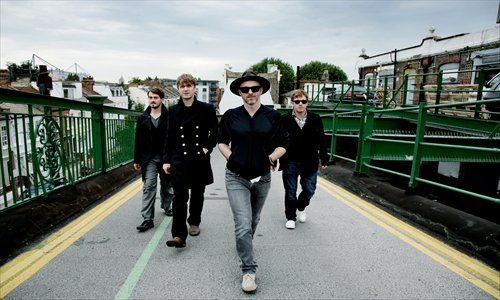Why Travis

At the height of their fame in the UK - around the release of sophomore album The Man Who, released in 1999 - Travis lead singer Fran Healy shaved off the sides of his head sporting what then became known as the "Hoxton fin" - a Mohawk hairstyle in stark juxtaposition to the gentle balladry of the songs that made him a household name. Soon after the band's media saturation began to grate on some, fair-weather fans disowned them as quickly as they had embraced them. The word "Travis" then became a byword for "lame rock," the blueprint for another Coldplay or just a derogatory term to be thrown at something uncool and undaring.
And yet these soft indie rockers from Glasgow, Scotland will headline the delectably named Strawberry Music Festival this year in Beijing, which takes place April 29 to May 1 at Tongzhou Canal Park, Tongzhou district. Also on the bill are noise-rock band Deerhoof.
As another spring breezes in, how do some foreign bands get selected to be the flagship marketing allure for local concertgoers? Festival headliners around the world this year include Paul McCartney at Bonnaroo in Tennessee; Blur and the Red Hot Chili Peppers at Coachella, California; Arctic Monkeys at Glastonbury, Somerset, England and Muse at Summer Sonic, Tokyo - to name just a few. These are big bands with a wide international fan base.
In Beijing, it often seems that foreign headlining acts are chosen at random, without much thought or consideration as to what they mean culturally - their image, music and current significance - either in China or in their home countries. Although once popular in the pre-Coldplay era, Travis as a band is neither in the realms of rock royalty like Bob Dylan in Beijing (2011) nor do they pass as a current musical trend, much like the hyped Grimes show at Mao Livehouse last week, which had a rabid audience rammed to the rafters.
"Why did we choose Travis instead of other Brit-pop bands like Coldplay?" Zang Keyu, 29, asks rhetorically over the telephone. He's the director of performance and operations at Modern Sky Records, the organizers behind Strawberry. "Coldplay is so famous right now. We're simply not there yet to be able to invite them. We are just not ready yet. Maybe we will try in three to five years."
Zang acknowledges that Travis were once a much more popular band than they are today. However, he is quick to state that - in his opinion at least - they are a "good band" and that a lot of musicians at Modern Sky like them.
"Travis meets the aesthetic of Modern Sky," he says. "We are always looking for some Brit-pop, post-punk bands from Europe."
Predictably, Travis' arrival in the capital for the first time is just one of a handful of dates on an already scheduled, wider tour of Asia.
"They have a new album coming out this year (LP7) and are touring Asia, so it's perfect timing," Zang says.
German electronic stalwarts Kraftwerk were Zang and Modern Sky's first headlining choice for Strawberry but that fell through because of "political reasons," Zang says.
"Through the cultural ministry's supervision we have to select the right bands," says Beijing music festival organizer Zeng Yu, 33, who has been at the helm of the Olympic Summer Music Festival started in 2009 and the World Cities Music Festival held in Chaoyang Park, started in 2010.
Zeng alludes to a "forbidden list" that names musical performers banned or deemed inappropriate for Chinese mass consumption. Despite not knowing who or what bands make this forbidden list (pro-Tibetan Radiohead and Bjork no doubt have engravings by now), Travis, Zeng says, is very safely away from making the black grade.
However, there is a far more practical reason why a band like Travis comes to visit the Chinese mainland.
"For all the festivals in Beijing, we don't have much of a budget for famous artists," Zeng says. "Ticket prices in Japan are 10 times the amount. I don't think the market is quite ready for such big international artists to headline a festival."
Like a lot of Western bands or musicians who come to play the Chinese mainland, local perceptions of their music - much like the consumption of American TV shows - come from fragmented online communities.
Travis' discography - from debut album Good Feeling (1997) to their latest effort Ode to J. Smith (2008) - were always available to Chinese through online channels both legal and illegal.
For Beijing college student Zhang Tingyu, 21, the song "Closer" from 2007's The Boy With No Name, which she first heard on radio station Hit FM, is one that manages to stick in her memory.
"I neither like nor hate Travis. I just know there is a band called Travis. And that is the only song I can remember," Zhang says.
In contrast, around the time of the album's release in the UK, teen-angst weekly music magazine The New Musical Express labeled the music within as (including "Closer") "impotent aural gruel" with "all the soul of a [train] platform announcement."
"They may not be so popular in Britain as much anymore," says Zhu Xiaoyi, 28, bassist of lovable Beijing-based pop-rock band The Life Journey.
"It doesn't affect their image," he continues. "I still love their music and I think they have lots of fans in China."
Zang says Travis has fans in China, although it's hard to quantify without record sales numbers.
"They are more of a pop band and pop music has more listeners in China," says Zang.
"I can't say we are 100 percent confident with Travis as headliners," he says. "But it's a fact we have to accept."